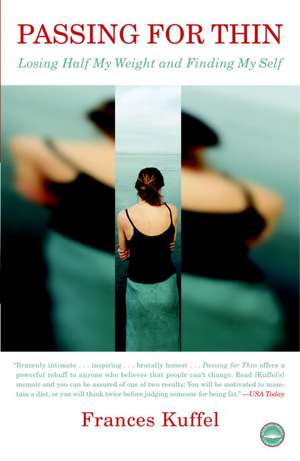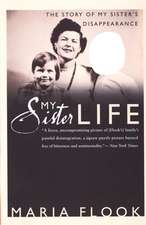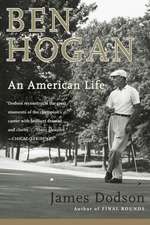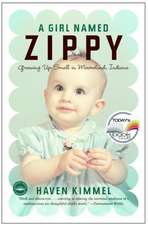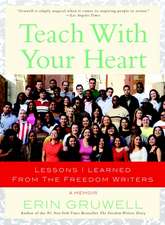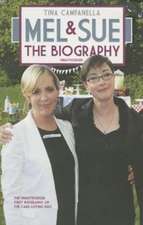Passing for Thin: Losing Half My Weight and Finding My Self
Autor Frances Kuffelen Limba Engleză Paperback – 30 noi 2004 – vârsta de la 14 până la 18 ani
When she was in her early forties, Frances Kuffel lost half her body weight. In Passing for Thin, Frances describes with unflinching honesty and a wickedly dark sense of humor her first fumbling introductions to her newly slender body, shining a light on the shared human experience of feeling uncomfortable in one’s own skin. She gradually moves from observer to player—enjoying for the first time flirting, exercising, and shopping–as she explores the terrain on the “Planet of Thin.” As Frances gradually comes to know—and love—the stranger in the mirror, she learns that her body does not define her, but enables her to become the woman she’s always wanted to be.
Preț: 100.57 lei
Nou
Puncte Express: 151
Preț estimativ în valută:
19.25€ • 20.92$ • 16.18£
19.25€ • 20.92$ • 16.18£
Carte disponibilă
Livrare economică 31 martie-14 aprilie
Preluare comenzi: 021 569.72.76
Specificații
ISBN-13: 9780767912921
ISBN-10: 0767912926
Pagini: 288
Dimensiuni: 132 x 205 x 16 mm
Greutate: 0.21 kg
Editura: BROADWAY BOOKS
ISBN-10: 0767912926
Pagini: 288
Dimensiuni: 132 x 205 x 16 mm
Greutate: 0.21 kg
Editura: BROADWAY BOOKS
Notă biografică
Frances Kuffel is a literary agent who has published poems and short stories in literary journals, such as Triquarterly, the Georgia Review, Glimmer Train, Prairie Schooner, and the Massachusetts Review. A native of Missoula, Montana, she has an M.F.A. from Cornell. She currently makes her home in Brooklyn, New York.
Extras
1
Arrival on the Planet of Fat
No one was there.
I was neither surprised nor unhappy to find myself alone at the Missoula airport. My parents had appointments that morning and had left the arrangements to my brother. Jim was late or the plane was early, it didn't matter. I was glad for the time. I could absorb the difference between New York and Montana. I'd left New York at dawn under its August pall of heat and rusty horizons and emerged into air so finespun it vibrated. The smell of ozone, clover, and cinnamon lingered from thunderstorms the night before, not yet evaporated in the dry desultory heat of midday; the cornflower sky glowed famously big, even in the valley. The Montanans milling around me at the curb were tall and blond, speaking with nasal cadences that, pronounced with a looser jaw, were a perfect west Texas drawl. Conversations there were always, I was reminded again, about the weather. Ask a Montanan about his chemotherapy and he'd give you that evening's forecast. Gaits and gestures were just shy of torpid, the sky and mountains rambled on and on in their own sweet time. Montana was a slow place.
I watched the crowd with the furtiveness of a refugee, hoping fervently I wouldn't see anyone I knew. I wasn't ready.
I am five feet eight inches tall, medium framed. That Friday noon I weighed 168 pounds, my lowest weight since sixth grade. I didn't know who or what I was as I braced myself for Jim's arrival. I had one history in that town, a mean one, of being a freak with a brain, allowed to watch but not play. A talking head on a mountain of formless flesh.
In second grade I weighed 115 pounds, by the end of sixth grade, 174 pounds. I lost a proud 36 pounds between my freshman and sophomore years in high school, getting down to 204 pounds. By college I struggled to stay at 248 pounds. I think. Our scale topped out at 245 so I was guesstimating. My top weight of all time: 338 pounds. I had begun this weight loss seventeen months earlier, in 1998, at 313 pounds. More or less--I didn't purchase a scale until the second week of the diet. Jim had last seen me, the year before, 100 pounds heavier.
And so I was glad for this pause, glad for the narrow opportunity of a cigarette, a five-year habit, before being thrust into my assiduously tobacco-free extended family. I was smoking at the curb when I saw Jim hurrying across the parking lot, scanning the clumps of people. Even my big brother's dash across a parking lot roused specters of the things he could do all those years that I could not.
Jim's eyes darted with worry as he paused for traffic. Had he missed me? Had the flight been delayed? He shook his head as he bolted around a pile of luggage, heading in to look for me at the carousel. I tossed my cigarette into the gutter, forming a joke about the life we've shared: Wanna buzz the root beer stand before we go to lunch? He walked right past me.
"Jim," I called.
He panned the sidewalk, looked at me, the other people, searching for the voice.
"Uh. Jim? Over here?"
The look--blank.
The second look--questioning. "France? Francie? Oh my--wow!" A beat as he took the measure of his reaction, then a conscious modulation. "I'm sorry. I didn't recognize you."
People ask, "Were you always fat?" The photographic evidence is inconclusive.
There is a picture taken for my father's office desk, a studio portrait: my brothers with Brill Cream-slick hair and cotton shirts buttoned up to the necks, my mother looking like Madeline Kahn in black and pearls, me, the baby of the family, front and center in a dotted Swiss confection that must have itched horribly. At two, I fill the dress to capacity, my arms dough-ample and my face full. A year later, a photo shows me sprawled next to Dick, my oldest brother. I'm rangy. My long legs are dimpled a bit at the knees but I'm growing out of the baby fat of that earlier family portrait. A year or so later, I am stalky-legged, my stomach pushes at the buttons of my dress. In this last photo I am intently inventorying the contents of my and my cousin's Easter baskets; she, blond and pixieish, is talking to the photographer.
Once in a while, a photograph distills a truth to its essence.
Everything about my next thirty-seven years can be culled from that picture. Fat and thin, my total absorption in food no matter whose it is, and other people's engagement with a world I blotted out.
I identified myself as fat at such an early age that for a long time there was no other adjective to follow. I held the strong suspicion that I was given my serious name because it echoed the word so closely: Fat Frances, Fatty Francie. I hated it. After my mother explained that only boys could be called Junior, I decided I wanted to be named Cathy.
"Fat" is a powerful word to a child. It's one of the first words we learn to read and spell, like "cat" and "dog." It yields similes so easily that it prods the teaser to greater flights of fancy. Where pigs are invoked, whales, elephants, and Sherman tanks are sure to follow.
The average preschooler is not often categorized, with any degree of finality, as mathematical or musical or athletic. She is "cute," "good," "bright." Even disparaging descriptions are carefully phrased for further evolution. "A difficult child." "A plain child." "A clumsy child." "A slow child." I was "fat." A noun, not a modification, to my ears it was my definition and destiny. Not remedial but remediless. It was not a matter of not living up to my potential or being on probation for further measurement, but a fait accompli, an irrevocable pronouncement. Right up there with "crippled," "mentally retarded," or "deformed."
Worse-squared were the terms that came later. One evening, in fourth grade, sitting companionably with my father as he ate dinner after late rounds at the hospital, I picked up a Journal of the American Medical Association and flipped idly through it. My father rarely initiated conversation, so questions were a good way to get him talking. "How does penicillin work?" might prompt ten minutes of explanation I didn't understand, but it was hearing his voice that I wanted most.
I paused over a photograph of glistening marbled guck, parted neatly by a retractor to display a cluster of pebbles. "Eee-ewe," I squealed with lascivious horror as I studied the caption. "What does--" I paused to spell out the unfamiliar word "--o-bee-sess' mean, Daddy?"
" 'Obese,'" he grunted. "That's you."
I knew exactly what he meant. The word tocked across my head like a cuckoo clock. "That's you. That's you. That's you."
The next question I'm asked is why I got fat. It's a remarkably Victorian question, the nexus of Mendel and Freud. Were my parents fat? Is it genetic? The answer "yes" holds the possibility of a kind of forgiveness born of inevitability. Oh, well, in that case . . . But my parents were not fat. And I am adopted so I don't know whether this is the trajectory of my forebears or an anomalous burp of biology. Lack of information turns the question to nurture versus nature. I can hear the interrogator's mental calliope churning, What happened?
Food happened. Food in conjunction with circumstances. My obesity snowballed. A few motivations for eating--safety, satisfaction--prompted half a lifetime's compulsive eating, which in turn made me a fat girl/woman to the world and a whore to food in my heart. Compare it to alcoholism. If bourbon helped Joe Doe ask a girl to dance one night, does that justify being drunk twenty years later?
Still, people want to know what lay behind the first compulsive bite.
I don't know; I don't remember.
I suspect I had the first bite hardwired into me, that anything could have gotten the snowball rolling. Maybe I wandered into the kitchen after Topo Gigio one Sunday night, and the worm turned. That was the cookie that was one too many, the first of thousands that wasn't enough.
I don't know why I started overeating, but I do know that food was animate, a completely mutual and unfailingly loyal friend. I ate not only because at that particular moment I was bored, but because it had comforted me when I was frightened by The Twilight Zone the night before, and excluded from ice skating last Saturday, and bereft when my parents went to a convention in Vancouver last year. My reasons snowballed as much as my weight did. Take any event or crisis and it included all those before it and any I could imagine for my future.
At five-thirty it had been dark for an hour, despite my father's daily announcement that the days were getting longer. Given the afternoon we'd been through they couldn't stay short enough. It was all-hands-on-deck, and we'd been cleaning since we'd gotten home from school. After eighteen months of building and endless finishing touches, our house, in a cul-de-sac of what would be ten classic sixties ranch houses owned by university professors, local business owners, and doctors, was done. Green shag wall-to-wall carpets, built-ins straight out of The Jetsons, paneling in every room. It was perfect. It was time to have the Monsignor to dinner.
Monsignor Meade was, as far as I could tell, 250 years old. He had been "the Monsignor" when my father went to St. Anthony's in the thirties. No matter was too small for the Monsignor. We all knew the story of how he chastised Dad about his high school girlfriend: "What's the matter, Leonard, Catholic girls aren't fast enough for ye?" He gave thundering sermons (" 'Stacy' is no name for a Catholic baby!"), checked us third graders' collection envelopes, and showed up in school to hand out grades, which he read and commented on. He had baptized me, heard my First Confession, and administered my First Communion the year before. My brothers had gone the same grade school course, as well as serving Mass for him. The Monsignor was known to scold or compliment altar boys on the altar, out loud, forming a crowded congregation's impression of said lad.
So, too, the Monsignor had taken a hand in fashioning my father's career, informing him that he would join the Knights of Columbus and take his Fourth Degree as a sign that he was a sanctioned Catholic doctor.
No one took this dinner lightly.
"You will come in when the Monsignor arrives," my father instructed Dick and Jim. "No horseplay. Afterward, you can go downstairs until supper, but keep it to a soft roar, understood?"
"And put your shoes on," my mother ordered. "Tell them to put their shoes on, Leonard."
"Shoes. On," my father ordered. You could ignore Mom; you risked your ass if you didn't obey Dad. This was not abuse, it was justice. He stated the rules and gave fair warning. We'd each tested him once or twice and never needed to again.
"And double-check your rooms," Mom added, now that she had Daddy's backing. "We'll be giving the Monsignor the tour of the house."
Dick, Jim, and I shuffled off to our rooms for a final inspection. My brothers looked like Dobie Gillis teenagers. They were popular and talented athletes with girlfriends and part-time jobs, well-loved jalopies, and letter jackets. The boys and I were bit players in the Dinner for the Monsignor, rounding out the cast of the Happy Catholic Family, but, at seventeen and fifteen, they had their own dramas, downstairs and after dessert. Rosalie and Helen, Scott and Don, shoot-'em-up TV, and Leslie Gore awaited them. I was onstage for the whole shebang, in my green plaid school uniform, properly shod, performing the tasks delegated by my parents, my passions nervily in heat. My affair with food, unlike my brothers' friends and girlfriends, didn't come after anything. It was with me all the time.
I was swooning in the promiscuous smells of company coming. Sterno and the buttery, clean-laundry waft of cheese dip in the chafing dish drifted under the beef Wellington in the oven, layered with carnations and candle wax, Mother's Chanel, and the acrid steam of the dishwasher. Freshly ironed white linen, the cold gleam of Lennox, my grandmother's crystal, the satin swirl of sterling. I loved to put the sugar spoon in my mouth, broad and whorled. It should not be overlooked, in the whys of compulsive eating, that food can be a raw flood of the five senses. My synapses crackled as I waited for the orgy to begin.
"Francie." My father interrupted my flirtations with the Wheat Thins. I was arranging the cold-cut plate by taking care of the broken crackers. "I need you to hold the match."
My shoulder blades pinched. Every night we tested my mettle against Dad's martinis and I flinched as he twisted a lemon peel over the flame. I was pleased to share this ritual with him and by my temerity, and I marveled at how the lemon oil flared, more smells, of burning and citrus, sulfur and juniper. Most of all I marveled at my father. Who else used pyrotechnics so casually?
He turned to mix Mom's Rob Roy next. "Honey," he said, stumped in front of the refrigerator shelves, "are we out of maraschino cherries?"
"We can't be," she said over the grinding beaters. She was whipping cream for the horseradish sauce. "Didn't I get a jar when the neighbors came over last week?"
Frowning with preoccupation, I backed out of the kitchen. It was one of a brace of phrases I dreaded: "I thought we had . . ." "Wasn't there a whole . . ." "I was planning on . . ." I would have a sudden urge to pee or look up the population of Egypt in the encyclopedia. I was gone, vamoose, away from the discussion of if-when-who, taking the box of Wheat Thins and Little House in the Big Woods for good measure.
I sat on the toilet and placed one perfect cracker in my mouth, like the Communion wafer, and sucked the salt off, waited for it to soften into goo. My heart settled and my stomach relaxed its clench against accusations. For half a box of crackers, I was occupied against any consequences. I might make it through a second or third repetition of this slow savoring before I stream-munched the rest of the box. I then had three problems: (1) the evidence of the box (toss under my bed for now rather than the bathroom trash), (2) salt-swollen lips and gummy teeth, and (3) the possibility that the Monsignor would turn out to like Wheat Thins as much as I did. Then we'd be back to the awful sentences. We had a whole box, Leonard . . .
From the Hardcover edition.
Arrival on the Planet of Fat
No one was there.
I was neither surprised nor unhappy to find myself alone at the Missoula airport. My parents had appointments that morning and had left the arrangements to my brother. Jim was late or the plane was early, it didn't matter. I was glad for the time. I could absorb the difference between New York and Montana. I'd left New York at dawn under its August pall of heat and rusty horizons and emerged into air so finespun it vibrated. The smell of ozone, clover, and cinnamon lingered from thunderstorms the night before, not yet evaporated in the dry desultory heat of midday; the cornflower sky glowed famously big, even in the valley. The Montanans milling around me at the curb were tall and blond, speaking with nasal cadences that, pronounced with a looser jaw, were a perfect west Texas drawl. Conversations there were always, I was reminded again, about the weather. Ask a Montanan about his chemotherapy and he'd give you that evening's forecast. Gaits and gestures were just shy of torpid, the sky and mountains rambled on and on in their own sweet time. Montana was a slow place.
I watched the crowd with the furtiveness of a refugee, hoping fervently I wouldn't see anyone I knew. I wasn't ready.
I am five feet eight inches tall, medium framed. That Friday noon I weighed 168 pounds, my lowest weight since sixth grade. I didn't know who or what I was as I braced myself for Jim's arrival. I had one history in that town, a mean one, of being a freak with a brain, allowed to watch but not play. A talking head on a mountain of formless flesh.
In second grade I weighed 115 pounds, by the end of sixth grade, 174 pounds. I lost a proud 36 pounds between my freshman and sophomore years in high school, getting down to 204 pounds. By college I struggled to stay at 248 pounds. I think. Our scale topped out at 245 so I was guesstimating. My top weight of all time: 338 pounds. I had begun this weight loss seventeen months earlier, in 1998, at 313 pounds. More or less--I didn't purchase a scale until the second week of the diet. Jim had last seen me, the year before, 100 pounds heavier.
And so I was glad for this pause, glad for the narrow opportunity of a cigarette, a five-year habit, before being thrust into my assiduously tobacco-free extended family. I was smoking at the curb when I saw Jim hurrying across the parking lot, scanning the clumps of people. Even my big brother's dash across a parking lot roused specters of the things he could do all those years that I could not.
Jim's eyes darted with worry as he paused for traffic. Had he missed me? Had the flight been delayed? He shook his head as he bolted around a pile of luggage, heading in to look for me at the carousel. I tossed my cigarette into the gutter, forming a joke about the life we've shared: Wanna buzz the root beer stand before we go to lunch? He walked right past me.
"Jim," I called.
He panned the sidewalk, looked at me, the other people, searching for the voice.
"Uh. Jim? Over here?"
The look--blank.
The second look--questioning. "France? Francie? Oh my--wow!" A beat as he took the measure of his reaction, then a conscious modulation. "I'm sorry. I didn't recognize you."
People ask, "Were you always fat?" The photographic evidence is inconclusive.
There is a picture taken for my father's office desk, a studio portrait: my brothers with Brill Cream-slick hair and cotton shirts buttoned up to the necks, my mother looking like Madeline Kahn in black and pearls, me, the baby of the family, front and center in a dotted Swiss confection that must have itched horribly. At two, I fill the dress to capacity, my arms dough-ample and my face full. A year later, a photo shows me sprawled next to Dick, my oldest brother. I'm rangy. My long legs are dimpled a bit at the knees but I'm growing out of the baby fat of that earlier family portrait. A year or so later, I am stalky-legged, my stomach pushes at the buttons of my dress. In this last photo I am intently inventorying the contents of my and my cousin's Easter baskets; she, blond and pixieish, is talking to the photographer.
Once in a while, a photograph distills a truth to its essence.
Everything about my next thirty-seven years can be culled from that picture. Fat and thin, my total absorption in food no matter whose it is, and other people's engagement with a world I blotted out.
I identified myself as fat at such an early age that for a long time there was no other adjective to follow. I held the strong suspicion that I was given my serious name because it echoed the word so closely: Fat Frances, Fatty Francie. I hated it. After my mother explained that only boys could be called Junior, I decided I wanted to be named Cathy.
"Fat" is a powerful word to a child. It's one of the first words we learn to read and spell, like "cat" and "dog." It yields similes so easily that it prods the teaser to greater flights of fancy. Where pigs are invoked, whales, elephants, and Sherman tanks are sure to follow.
The average preschooler is not often categorized, with any degree of finality, as mathematical or musical or athletic. She is "cute," "good," "bright." Even disparaging descriptions are carefully phrased for further evolution. "A difficult child." "A plain child." "A clumsy child." "A slow child." I was "fat." A noun, not a modification, to my ears it was my definition and destiny. Not remedial but remediless. It was not a matter of not living up to my potential or being on probation for further measurement, but a fait accompli, an irrevocable pronouncement. Right up there with "crippled," "mentally retarded," or "deformed."
Worse-squared were the terms that came later. One evening, in fourth grade, sitting companionably with my father as he ate dinner after late rounds at the hospital, I picked up a Journal of the American Medical Association and flipped idly through it. My father rarely initiated conversation, so questions were a good way to get him talking. "How does penicillin work?" might prompt ten minutes of explanation I didn't understand, but it was hearing his voice that I wanted most.
I paused over a photograph of glistening marbled guck, parted neatly by a retractor to display a cluster of pebbles. "Eee-ewe," I squealed with lascivious horror as I studied the caption. "What does--" I paused to spell out the unfamiliar word "--o-bee-sess' mean, Daddy?"
" 'Obese,'" he grunted. "That's you."
I knew exactly what he meant. The word tocked across my head like a cuckoo clock. "That's you. That's you. That's you."
The next question I'm asked is why I got fat. It's a remarkably Victorian question, the nexus of Mendel and Freud. Were my parents fat? Is it genetic? The answer "yes" holds the possibility of a kind of forgiveness born of inevitability. Oh, well, in that case . . . But my parents were not fat. And I am adopted so I don't know whether this is the trajectory of my forebears or an anomalous burp of biology. Lack of information turns the question to nurture versus nature. I can hear the interrogator's mental calliope churning, What happened?
Food happened. Food in conjunction with circumstances. My obesity snowballed. A few motivations for eating--safety, satisfaction--prompted half a lifetime's compulsive eating, which in turn made me a fat girl/woman to the world and a whore to food in my heart. Compare it to alcoholism. If bourbon helped Joe Doe ask a girl to dance one night, does that justify being drunk twenty years later?
Still, people want to know what lay behind the first compulsive bite.
I don't know; I don't remember.
I suspect I had the first bite hardwired into me, that anything could have gotten the snowball rolling. Maybe I wandered into the kitchen after Topo Gigio one Sunday night, and the worm turned. That was the cookie that was one too many, the first of thousands that wasn't enough.
I don't know why I started overeating, but I do know that food was animate, a completely mutual and unfailingly loyal friend. I ate not only because at that particular moment I was bored, but because it had comforted me when I was frightened by The Twilight Zone the night before, and excluded from ice skating last Saturday, and bereft when my parents went to a convention in Vancouver last year. My reasons snowballed as much as my weight did. Take any event or crisis and it included all those before it and any I could imagine for my future.
At five-thirty it had been dark for an hour, despite my father's daily announcement that the days were getting longer. Given the afternoon we'd been through they couldn't stay short enough. It was all-hands-on-deck, and we'd been cleaning since we'd gotten home from school. After eighteen months of building and endless finishing touches, our house, in a cul-de-sac of what would be ten classic sixties ranch houses owned by university professors, local business owners, and doctors, was done. Green shag wall-to-wall carpets, built-ins straight out of The Jetsons, paneling in every room. It was perfect. It was time to have the Monsignor to dinner.
Monsignor Meade was, as far as I could tell, 250 years old. He had been "the Monsignor" when my father went to St. Anthony's in the thirties. No matter was too small for the Monsignor. We all knew the story of how he chastised Dad about his high school girlfriend: "What's the matter, Leonard, Catholic girls aren't fast enough for ye?" He gave thundering sermons (" 'Stacy' is no name for a Catholic baby!"), checked us third graders' collection envelopes, and showed up in school to hand out grades, which he read and commented on. He had baptized me, heard my First Confession, and administered my First Communion the year before. My brothers had gone the same grade school course, as well as serving Mass for him. The Monsignor was known to scold or compliment altar boys on the altar, out loud, forming a crowded congregation's impression of said lad.
So, too, the Monsignor had taken a hand in fashioning my father's career, informing him that he would join the Knights of Columbus and take his Fourth Degree as a sign that he was a sanctioned Catholic doctor.
No one took this dinner lightly.
"You will come in when the Monsignor arrives," my father instructed Dick and Jim. "No horseplay. Afterward, you can go downstairs until supper, but keep it to a soft roar, understood?"
"And put your shoes on," my mother ordered. "Tell them to put their shoes on, Leonard."
"Shoes. On," my father ordered. You could ignore Mom; you risked your ass if you didn't obey Dad. This was not abuse, it was justice. He stated the rules and gave fair warning. We'd each tested him once or twice and never needed to again.
"And double-check your rooms," Mom added, now that she had Daddy's backing. "We'll be giving the Monsignor the tour of the house."
Dick, Jim, and I shuffled off to our rooms for a final inspection. My brothers looked like Dobie Gillis teenagers. They were popular and talented athletes with girlfriends and part-time jobs, well-loved jalopies, and letter jackets. The boys and I were bit players in the Dinner for the Monsignor, rounding out the cast of the Happy Catholic Family, but, at seventeen and fifteen, they had their own dramas, downstairs and after dessert. Rosalie and Helen, Scott and Don, shoot-'em-up TV, and Leslie Gore awaited them. I was onstage for the whole shebang, in my green plaid school uniform, properly shod, performing the tasks delegated by my parents, my passions nervily in heat. My affair with food, unlike my brothers' friends and girlfriends, didn't come after anything. It was with me all the time.
I was swooning in the promiscuous smells of company coming. Sterno and the buttery, clean-laundry waft of cheese dip in the chafing dish drifted under the beef Wellington in the oven, layered with carnations and candle wax, Mother's Chanel, and the acrid steam of the dishwasher. Freshly ironed white linen, the cold gleam of Lennox, my grandmother's crystal, the satin swirl of sterling. I loved to put the sugar spoon in my mouth, broad and whorled. It should not be overlooked, in the whys of compulsive eating, that food can be a raw flood of the five senses. My synapses crackled as I waited for the orgy to begin.
"Francie." My father interrupted my flirtations with the Wheat Thins. I was arranging the cold-cut plate by taking care of the broken crackers. "I need you to hold the match."
My shoulder blades pinched. Every night we tested my mettle against Dad's martinis and I flinched as he twisted a lemon peel over the flame. I was pleased to share this ritual with him and by my temerity, and I marveled at how the lemon oil flared, more smells, of burning and citrus, sulfur and juniper. Most of all I marveled at my father. Who else used pyrotechnics so casually?
He turned to mix Mom's Rob Roy next. "Honey," he said, stumped in front of the refrigerator shelves, "are we out of maraschino cherries?"
"We can't be," she said over the grinding beaters. She was whipping cream for the horseradish sauce. "Didn't I get a jar when the neighbors came over last week?"
Frowning with preoccupation, I backed out of the kitchen. It was one of a brace of phrases I dreaded: "I thought we had . . ." "Wasn't there a whole . . ." "I was planning on . . ." I would have a sudden urge to pee or look up the population of Egypt in the encyclopedia. I was gone, vamoose, away from the discussion of if-when-who, taking the box of Wheat Thins and Little House in the Big Woods for good measure.
I sat on the toilet and placed one perfect cracker in my mouth, like the Communion wafer, and sucked the salt off, waited for it to soften into goo. My heart settled and my stomach relaxed its clench against accusations. For half a box of crackers, I was occupied against any consequences. I might make it through a second or third repetition of this slow savoring before I stream-munched the rest of the box. I then had three problems: (1) the evidence of the box (toss under my bed for now rather than the bathroom trash), (2) salt-swollen lips and gummy teeth, and (3) the possibility that the Monsignor would turn out to like Wheat Thins as much as I did. Then we'd be back to the awful sentences. We had a whole box, Leonard . . .
From the Hardcover edition.
Recenzii
"This is a book that will grab you and hold you in its grip, and break your heart even as it inspires you. Frances Kuffel's memoir is so real, so alive with honesty and clarity, you will never forget it. It is a Pilgrim's Progress toward the holy city of thin. Kuffel is our confessional poet of fatness, and the struggle toward fitness, beauty, love. She is entertaining and tough, vivid and funny, in a story of victory that will delight every single reader."
--Robert Morgan, author of Brave Enemies
"Frances Kuffel set out on a true adventure, navigated the dangers, endured, and emerged transfigured. What makes her tale intriguing is that the terrain in question was her own body and its tyrannies. This is a story for our times from a writer with the language, courage and experience to tell it."
--Deidre McNamer, author of Rima in the Weeds and My Russian
This book is simply riveting. There is not a woman who's ever carried more than her share of body weight, who won't identify with every word that Frances Kuffel has written. Kuffel's journey is rich in wit and wisdom. Her book is a jewel and a must have for anyone who's ever contemplated improving their body as well as their mind."
--Pam Peeke MD, MPH, Pew Foundation Scholar in Nutrition and Metabolism, Assistant Professor of Medicine University of Maryland School of Medicine, Author of Fight Fat After Forty, NBC Today Show Medical Expert
From the Hardcover edition.
--Robert Morgan, author of Brave Enemies
"Frances Kuffel set out on a true adventure, navigated the dangers, endured, and emerged transfigured. What makes her tale intriguing is that the terrain in question was her own body and its tyrannies. This is a story for our times from a writer with the language, courage and experience to tell it."
--Deidre McNamer, author of Rima in the Weeds and My Russian
This book is simply riveting. There is not a woman who's ever carried more than her share of body weight, who won't identify with every word that Frances Kuffel has written. Kuffel's journey is rich in wit and wisdom. Her book is a jewel and a must have for anyone who's ever contemplated improving their body as well as their mind."
--Pam Peeke MD, MPH, Pew Foundation Scholar in Nutrition and Metabolism, Assistant Professor of Medicine University of Maryland School of Medicine, Author of Fight Fat After Forty, NBC Today Show Medical Expert
From the Hardcover edition.
